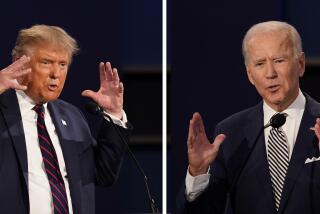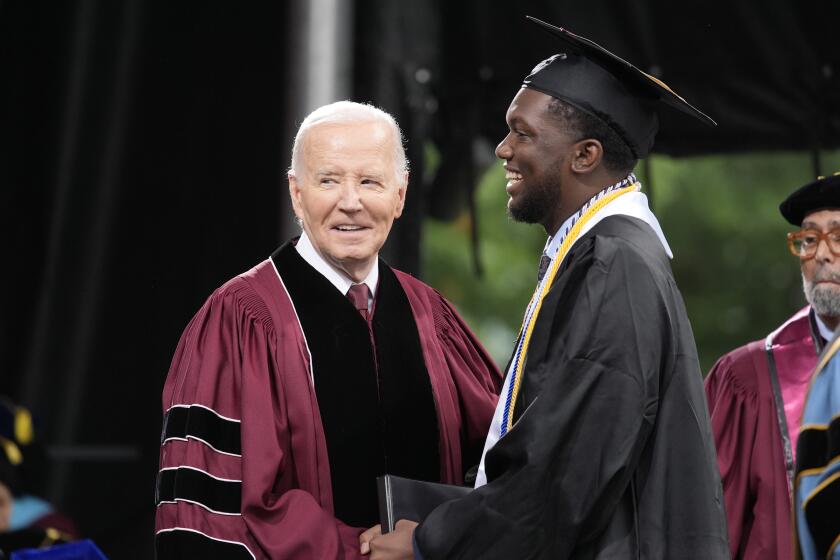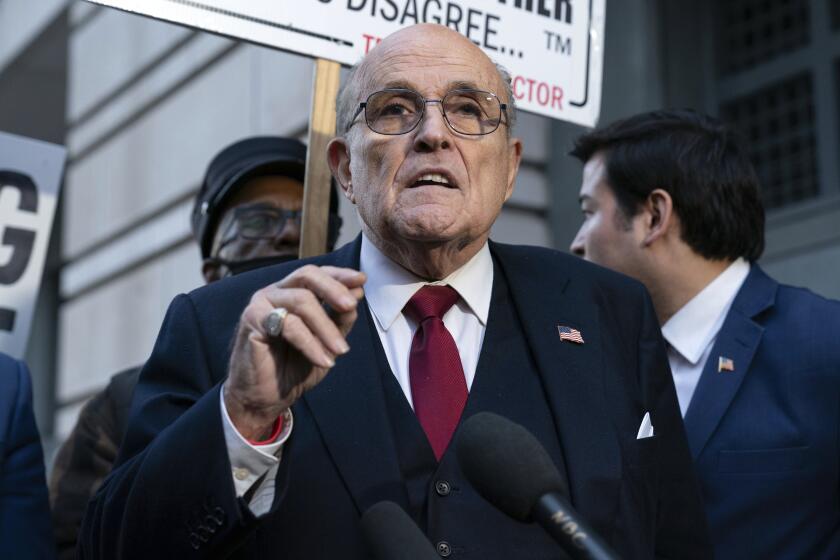‘84 Hart Campaign Funding Probed : FEC to Determine if $900,000 in Credit for Ads Broke Law
The Federal Election Commission is investigating three aspects of the financing of Gary Hart’s 1984 presidential campaign, including whether Hart violated federal election laws by buying nearly $900,000 of advertising on credit from a company controlled by one of his financial backers, Hart campaign officials said Thursday.
Hart, the front-runner for next year’s Democratic presidential nomination, has failed to pay back about $400,000 of that debt, and the FEC is examining whether that sum represents a corporate campaign contribution, an illegal practice under federal law.
Controversy over Hart’s $1.3 million in lingering 1984 campaign debts has dogged his current White House bid even before the FEC investigation.
Hart campaign manager Bill Dixon said that Hart’s lawyers plan to meet with FEC officials early next week to discuss the possibility of paying a fine “without any admission of doing wrong” to close the books on the 1984 contest.
On the campaign trail, Hart is making a concerted effort to brush off his 1984 problem as a chapter soon to be finished. When he learned that the mayor of Wilson, N.C., was going to offer him the key to the city Thursday, he said: “I hope it’s to a bank.”
‘Will Be a Plus’
In the end, he insisted in an earlier appearance at Raleigh, N.C., the issue “will be a plus” for his campaign because “the issue is not the debt, the issue is special-interest PAC money.” He has pledged not to accept contributions from political action committees sponsored by corporations, labor or other special-interest groups.
Dixon said that the FEC, in its investigation of Hart’s 1984 campaign, is looking at irregularities in the handling of 49 individual contributions the candidate received in February and March, 1984.
The commission also is questioning the campaign’s use of Hart’s personal American Express card to cover roughly $20,000 in campaign bills, Dixon said. The commission says the practice may have amounted to an unauthorized loan by the candidate to his campaign.
Dixon called these two issues “minuscule” matters of “internal bookkeeping.”
Of greater concern to the Hart campaign is the FEC investigation of Group III Communications of Portsmouth, Va., which did substantial work for Hart’s 1984 campaign and recently signed a contract worth up to $3 million to work in Hart’s current effort.
According to records on file with the Virginia Corporation Commission, Group III’s president, treasurer and sole director is Dr. Ronald Dozoretz, a millionaire psychiatrist and businessman and vice chairman of the Virginia Democratic Party, who is widely reported to be considering a senatorial bid in that state next year.
Long-Time Friend
Dozoretz is a “long-time friend of Gary’s,” according to Michael Novelli, who until recently was the chief fund-raiser working on retiring Hart’s 1984 debt.
A year and a half ago, Dixon said, the FEC asked for evidence that Group III’s extension of credit was part of its “normal course of business,” as required by campaign law.
Dissatisfied with the evidence that the campaign submitted, the FEC last week opened a 15-day period in which it would discuss settling the case. After that, the agency’s lawyers would consider whether probable cause exists to begin formal proceedings against Hart. Although criminal prosecution is possible, the worst likely outcome would be a fine.
Dixon denied that the campaign’s relationship with Group III was in any way “out of the ordinary.”
“There are some people out there who don’t want Gary Hart to be President” and who may be “spreading rumors,” he said, but “Gary Hart and Ron Dozoretz never reached any agreement” to funnel money to the campaign. Dozoretz in 1984 supported other candidates besides Hart, Dixon noted.
The question of when a company may extend credit to a campaign has been in dispute for years. Any extension of credit that is not “commercially reasonable” could be considered an illegal contribution, experts on campaign law said Thursday.
Similar Test for Glenn
The FEC used a similar test of commercial reasonableness in suing John Glenn’s 1984 campaign committee over loans that the Ohio Democratic senator received from banks in his home state. The case, which could lead to a fine against the Glenn campaign, goes to trial on May 4 in federal court in Columbus, Ohio.
Hart also took out substantial loans during his campaign and supplemented them with credit from companies that supplied services to the campaign. Group III was among the largest of those creditors.
Dozoretz denied any political influence in the decision to extend credit to Hart. “I have no management role at all” in the company, he said. “It was a business judgment.”
The company’s involvement with Hart began in the hectic days immediately after Hart’s victory in the 1984 New Hampshire primary, which triggered a surge of contributions to the Hart campaign.
“The fund-raising spigot had been turned on and the money was coming in faster than they could count it,” said David Iwans, Group III’s vice president and creative director.
But the campaign had to start advertising immediately in states with primaries shortly after New Hampshire’s, Iwans said. Group III developed a campaign centered around the slogan, “America take Hart,” and put up its own money to buy television time in several key Southern states.
Repaid Initial Outlay
FEC records show that the company bought advertising worth $445,000 in March. Hart’s campaign repaid all of that initial outlay within 30 days, Iwans said.
The company continued to do work for Hart, but Hart’s campaign contributions fell off. FEC records show that Group III made $396,000 in media buys for the Hart campaign before the California and New Jersey primaries. The buys were entirely on credit, and were not repaid.
Through last month, Hart’s 1984 campaign committee owed $421,000 to Group III. In late March, according to Hart’s latest filing with the FEC, Group III accepted a 10-cents-on-the-dollar settlement.
Group III has made aggressive efforts to collect the debt, Dozoretz and Iwans said. Although the company lost money working for Hart, “it was very commercially viable,” Iwans said. “We acted based on their word. I was naive.”
Group III’s willingness to extend credit to Hart was unusual, Iwans conceded, by the standards that govern campaigns and their media buyers. Companies extend credit for their own production costs but for the actual cost of buying television time, “the practice is cash in advance, and it’s never violated,” said Ray Strother, Hart’s chief media adviser.
Companies sometimes extend credit to nonpolitical clients, however, and a company that had not previously worked in politics might not understand that the rules were different, Strother added.
Staff writer Karen Tumulty contributed to this story from North Carolina.
More to Read
Get the L.A. Times Politics newsletter
Deeply reported insights into legislation, politics and policy from Sacramento, Washington and beyond. In your inbox three times per week.
You may occasionally receive promotional content from the Los Angeles Times.







